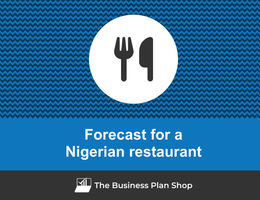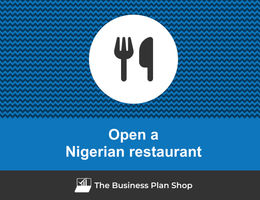How to write a business plan for a Nigerian restaurant?
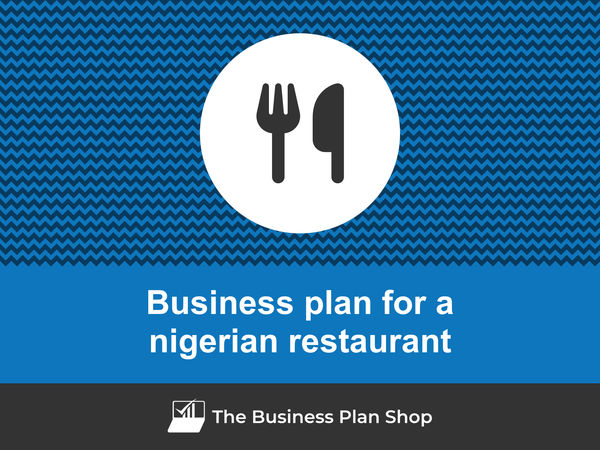
Putting together a business plan for a Nigerian restaurant can be daunting - especially if you're creating a business for the first time - but with this comprehensive guide, you'll have the necessary tools to do it confidently.
We will explore why writing one is so important in both starting up and growing an existing Nigerian restaurant, as well as what should go into making an effective plan - from its structure to content - and what tools can be used to streamline the process and avoid errors.
Without further ado, let us begin!
Why write a business plan for a Nigerian restaurant?
Having a clear understanding of why you want to write a business plan for your Nigerian restaurant will make it simpler for you to grasp the rationale behind its structure and content. So before delving into the plan's actual details, let's take a moment to remind ourselves of the primary reasons why you'd want to create a Nigerian restaurant business plan.
To have a clear roadmap to grow the business
Small businesses rarely experience a constant and predictable environment. Economic cycles go up and down, while the business landscape is mutating constantly with new regulations, technologies, competitors, and consumer behaviours emerging when we least expect it.
In this dynamic context, it's essential to have a clear roadmap for your Nigerian restaurant. Otherwise, you are navigating in the dark which is dangerous given that - as a business owner - your capital is at risk.
That's why crafting a well-thought-out business plan is crucial to ensure the long-term success and sustainability of your venture.
To create an effective business plan, you'll need to take a step-by-step approach. First, you'll have to assess your current position (if you're already in business), and then identify where you'd like your Nigerian restaurant to be in the next three to five years.
Once you have a clear destination for your Nigerian restaurant, you'll focus on three key areas:
- Resources: you'll determine the human, equipment, and capital resources needed to reach your goals successfully.
- Speed: you'll establish the optimal pace at which your business needs to grow if it is to meet its objectives within the desired timeframe.
- Risks: you'll identify and address potential risks you might encounter along the way.
By going through this process regularly, you'll be able to make informed decisions about resource allocation, paving the way for the long-term success of your business.
To anticipate future cash flows
Regularly comparing your actual financial performance to the projections in the financial forecast of your Nigerian restaurant's business plan gives you the ability to monitor your business's financial health and make necessary adjustments as needed.
This practice allows you to detect potential financial issues, such as unexpected cash shortfalls before they escalate into major problems. Giving you time to find additional financing or put in place corrective measures.
Additionally, it helps you identify growth opportunities, like excess cash flow that could be allocated to launch new products and services or expand into new markets.
Staying on track with these regular comparisons enables you to make well-informed decisions about the amount of financing your business might require, or the excess cash flow you can expect to generate from your main business activities.
To secure financing
Crafting a comprehensive business plan for your Nigerian restaurant, whether you're starting up or already established, is paramount when you're seeking financing from banks or investors.
Given how fragile small businesses are, financiers will want to ensure that you have a clear roadmap in place as well as command and control of your future cash flows before entertaining the idea of funding you.
For banks, the information in your business plan will be used to assess your borrowing capacity - which is defined as the maximum amount of debt your business can afford alongside your ability to repay the loan. This evaluation helps them decide whether to extend credit to your business and under what terms (interest rate, duration, repayment options, collateral, etc.).
Similarly, investors will thoroughly review your plan to determine if their investment can yield an attractive return. They'll be looking for evidence that your Nigerian restaurant has the potential for healthy growth, profitability, and consistent cash flow generation over time.
Now that you understand the importance of creating a business plan for your Nigerian restaurant, let's delve into the necessary information needed to craft an effective plan.
Need a convincing business plan?
The Business Plan Shop makes it easy to create a financial forecast to assess the potential profitability of your projects, and write a business plan that’ll wow investors.

Information needed to create a business plan for a Nigerian restaurant
Drafting a Nigerian restaurant business plan requires research so that you can project sales, investments and cost accurately in your financial forecast, and convince the reader that there is a viable commercial opportunity to be seized.
Below, we'll focus on three critical pieces of information you should gather before starting to write your plan.
Carrying out market research for a Nigerian restaurant
As you consider writing your business plan for a Nigerian restaurant, conducting market research becomes a vital step to ensure accurate and realistic financial projections.
Market research provides valuable insights into your target customer base, competitors, pricing strategies, and other key factors that can significantly impact the commercial success of your business.
Through this research, you may uncover trends that could influence your Nigerian restaurant.
You might find that customers may be looking for more spicy, flavorful dishes. Additionally, research may suggest that customers could be interested in Nigerian-inspired fusion dishes that combine traditional flavors with more modern elements.
Such market trends play a significant role in forecasting revenue, as they offer valuable data about potential customers' spending habits and preferences.
By incorporating these findings into your financial projections, you can present investors with more accurate information, helping them make informed decisions about investing in your Nigerian restaurant.
Developing the sales and marketing plan for a Nigerian restaurant
Budgeting sales and marketing expenses is essential before creating a Nigerian restaurant business plan.
A comprehensive sales and marketing plan should provide an accurate projection of what actions need to be implemented to acquire and retain customers, how many people are needed to carry out these initiatives, and how much needs to be spent on promotions, advertising, and other aspects.
This helps ensure that the right amount of resources is allocated to these activities in order to hit the sales and growth objectives forecasted in your business plan.
The staffing and equipment needs of a Nigerian restaurant
As you embark on starting or expanding your Nigerian restaurant, having a clear plan for recruitment and capital expenditures (investment in equipment and real estate) is essential for ensuring your business's success.
Both the recruitment and investment plans must align with the timing and level of growth projected in your forecast, and they require appropriate funding.
A Nigerian restaurant may incur staffing costs such as wages for cooks, servers, dishwashers, and other staff, as well as payroll taxes and insurance. They may also need to purchase equipment such as ovens, grills, refrigerators, fryers, and other restaurant-specific items. Additionally they may need to purchase food supplies such as meats, vegetables, spices, and other ingredients.
To create a realistic financial forecast, you also need to consider other operating expenses associated with the day-to-day running of your business, such as insurance and bookkeeping.
With all the necessary information at hand, you are ready to begin crafting your business plan and developing your financial forecast.
What goes into your Nigerian restaurant's financial forecast?
The financial forecast of your Nigerian restaurant's business plan will enable you to assess the growth, profitability, funding requirements, and cash generation potential of your business in the coming years.
The four key outputs of a financial forecast for a Nigerian restaurant are:
- The profit and loss (P&L) statement,
- The projected balance sheet,
- The cash flow forecast,
- And the sources and uses table.
Let's look at each of these in a bit more detail.
The projected P&L statement
The projected P&L statement for a Nigerian restaurant shows how much revenue and profit your business is expected to make in the future.
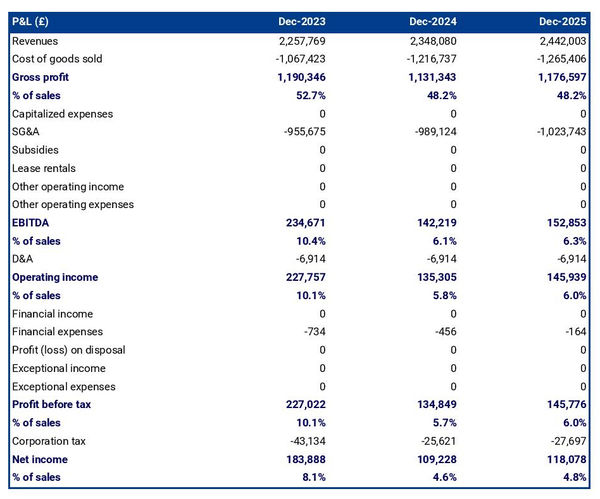
A healthy Nigerian restaurant's P&L statement should show:
- Sales growing at (minimum) or above (better) inflation
- Stable (minimum) or expanding (better) profit margins
- A healthy level of net profitability
This will of course depend on the stage of your business: numbers for a startup will look different than for an established Nigerian restaurant.
The projected balance sheet of your Nigerian restaurant
Your Nigerian restaurant's forecasted balance sheet enables the reader of your plan to assess your financial structure, working capital, and investment policy.
It is composed of three types of elements: assets, liabilities and equity:
- Assets: represent what the business owns and uses to produce cash flows. It includes resources such as cash, equipment, and accounts receivable (money owed by clients).
- Liabilities: represent funds advanced to the business by lenders and other creditors. It includes items such as accounts payable (money owed to suppliers), taxes due and loans.
- Equity: is the combination of what has been invested by the business owners and the cumulative profits and losses generated by the business to date (which are called retained earnings). Equity is a proxy for the value of the owner's stake in the business.
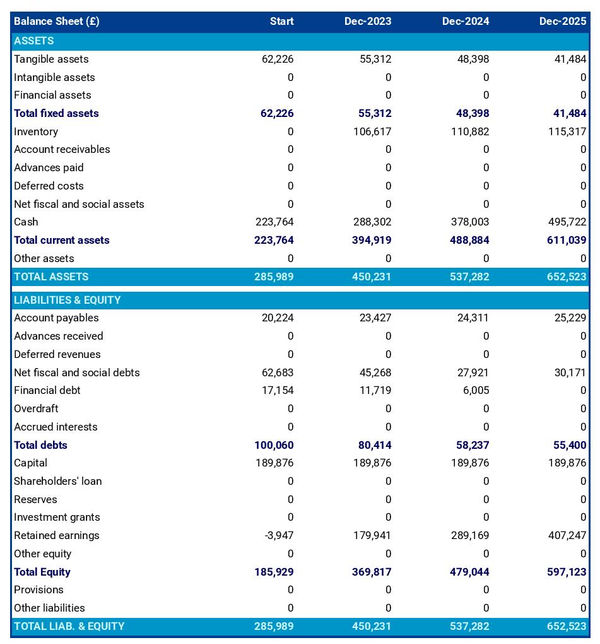
Your Nigerian restaurant's balance sheet will usually be analyzed in conjunction with the other financial statements included in your forecast.
Two key points of focus will be:
- Your Nigerian restaurant's liquidity: does your business have sufficient cash and short-term assets to pay what it owes over the next 12 months?
- And its solvency: does your business have the capacity to repay its debt over the medium-term?
The projected cash flow statement
A cash flow forecast for a Nigerian restaurant shows how much cash the business is projected to generate or consume.
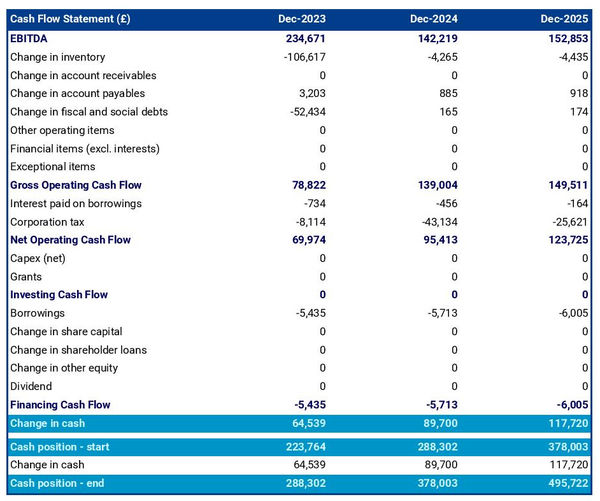
The cash flow statement is divided into 3 main areas:
- The operating cash flow shows how much cash is generated or consumed by the operations (running the business)
- The investing cash flow shows how much cash is being invested in capital expenditure (equipment, real estate, etc.)
- The financing cash flow shows how much cash is raised or distributed to investors and lenders
Looking at the cash flow forecast helps you to ensure that your business has enough cash to keep running, and can help you anticipate potential cash shortfalls.
It is also a best practice to include a monthly cash flow statement in the appendices of your Nigerian restaurant business plan so that the readers can view the impact of seasonality on your business cash position and generation.
The initial financing plan
The initial financing plan, also known as a sources and uses table, is a valuable resource to have in your business plan when starting your Nigerian restaurant as it reveals the origins of the money needed to establish the business (sources) and how it will be allocated (uses).

Having this table helps show what costs are involved in setting up your Nigerian restaurant, how risks are shared between founders, investors and lenders, and what the starting cash position will be. This cash position needs to be sufficient to sustain operations until the business reaches a break-even point.
Now that you have a clear understanding of what goes into the financial forecast of your Nigerian restaurant business plan, let's shift our focus to the written part of the plan.
Need a convincing business plan?
The Business Plan Shop makes it easy to create a financial forecast to assess the potential profitability of your projects, and write a business plan that’ll wow investors.

The written part of a Nigerian restaurant business plan
The written part of a Nigerian restaurant business plan is composed of 7 main sections:
- The executive summary
- The presentation of the company
- The products and services
- The market analysis
- The strategy
- The operations
- The financial plan
Throughout these sections, you will seek to provide the reader with the details and context needed for them to form a view on whether or not your business plan is achievable and your forecast a realistic possibility.
Let's go through the content of each section in more detail!
1. The executive summary
In your Nigerian restaurant's business plan, the first section is the executive summary — a captivating overview of your plan that aims to pique the reader's interest and leave them eager to learn more about your business.
When crafting the executive summary, start with an introduction to your business, including its name, concept, location, how long it has been running, and what sets it apart. Briefly mention the products and services you plan to offer and your target customer profile.
Following that, provide an overview of the addressable market for your Nigerian restaurant, current trends, and potential growth opportunities.
Next, include a summary of key financial figures like projected revenues, profits, and cash flows.
Finally, in the "ask" section, detail any funding requirements you may have.
2. The presentation of the company
In your Nigerian restaurant business plan, the second section should focus on the structure and ownership, location, and management team of your company.
In the structure and ownership part, you'll provide an overview of the business's legal structure, details about the owners, and their respective investments and ownership shares. This clarity is crucial, especially if you're seeking financing, as it helps the reader understand which legal entity will receive the funds and who controls the business.
Moving on to the location part, you'll offer an overview of the company's premises and their surroundings. Explain why this particular location is of interest, highlighting factors like catchment area, accessibility, and nearby amenities.
When describing the location of your Nigerian restaurant, you may want to emphasize its potential to draw in customers from a large and diverse local population. You could mention that the area has good transportation links, and that it is situated in a central, accessible location. You might point out that the area is home to many other restaurants, which could help to create an interesting and vibrant atmosphere. You could also emphasize the fact that the area could be an ideal spot for a Nigerian restaurant, due to its large population of people with an interest in African cuisine. Finally, you may want to emphasize the potential for growth and success in the area.
Finally, you should introduce your management team. Describe each member's role, background, and experience.
Don't forget to emphasize any past successes achieved by the management team and how long they've been working together. Demonstrating their track record and teamwork will help potential lenders or investors gain confidence in their leadership and ability to execute the business plan.
3. The products and services section
The products and services section of your Nigerian restaurant business plan should include a detailed description of what your company sells to its customers.
For example, your Nigerian restaurant could offer traditional Nigerian dishes such as jollof rice, suya, and egusi soup as well as classic favorites like grilled chicken and plantain. You could offer catering services for special events, host live music nights, and provide takeout and delivery services. All of these offerings will help to make your restaurant an attractive destination for customers who are looking for delicious, authentic Nigerian cuisine.
The reader will want to understand what makes your Nigerian restaurant unique from other businesses in this competitive market.
When drafting this section, you should be precise about the categories of products or services you sell, the clients you are targeting and the channels that you are targeting them through.
4. The market analysis
When presenting your market analysis in your Nigerian restaurant business plan, you should detail the customers' demographics and segmentation, target market, competition, barriers to entry, and any regulations that may apply.
The goal of this section is to help the reader understand how big and attractive your market is, and demonstrate that you have a solid understanding of the industry.
You should start with the demographics and segmentation subsection, which gives an overview of the addressable market for your Nigerian restaurant, the main trends in the marketplace, and introduces the different customer segments and their preferences in terms of purchasing habits and budgets.
The target market section should follow and zoom on the customer segments your Nigerian restaurant is targeting, and explain how your products and services meet the specific needs of these customers.
For example, your target market might include busy professionals. These people often have limited time for preparing meals and may be looking for a convenient, tasty alternative. They might appreciate a restaurant that offers quick, affordable, and delicious options that cater to their needs.
Then comes the competition subsection, where you should introduce your main competitors and explain what differentiates you from them.
Finally, you should finish your market analysis by giving an overview of the main regulations applicable to your Nigerian restaurant.
5. The strategy section
When writing the strategy section of a business plan for your Nigerian restaurant, it is essential to include information about your competitive edge, pricing strategy, sales & marketing plan, milestones, and risks and mitigants.
The competitive edge subsection should explain what sets your company apart from its competitors. This part is especially key if you are writing the business plan of a startup, as you have to make a name for yourself in the marketplace against established players.
The pricing strategy subsection should demonstrate how you intend to remain profitable while still offering competitive prices to your customers.
The sales & marketing plan should outline how you intend to reach out and acquire new customers, as well as retain existing ones with loyalty programs or special offers.
The milestones subsection should outline what your company has achieved to date, and its main objectives for the years to come - along with dates so that everyone involved has clear expectations of when progress can be expected.
The risks and mitigants subsection should list the main risks that jeopardize the execution of your plan and explain what measures you have taken to minimize these. This is essential in order for investors or lenders to feel secure in investing in your venture.
Your Nigerian restaurant could face a variety of risks. First, the restaurant may be vulnerable to food safety issues, such as contamination or spoilage. It is important to ensure that all food is prepared properly and stored correctly. Additionally, it is important to be aware of any food allergies customers may have so that they can be properly accommodated. Second, your Nigerian restaurant could be at risk of theft or damage. It is important to have a secure system in place for protecting the restaurant's assets. This could include installing security cameras, alarms, or other safety protocols. Additionally, it is important to make sure that any staff members working in the restaurant have been properly vetted and background checked.
6. The operations section
The operations of your Nigerian restaurant must be presented in detail in your business plan.
The first thing you should cover in this section is your staffing team, the main roles, and the overall recruitment plan to support the growth expected in your business plan. You should also outline the qualifications and experience necessary to fulfil each role, and how you intend to recruit (using job boards, referrals, or headhunters).
You should then state the operating hours of your Nigerian restaurant - so that the reader can check the adequacy of your staffing levels - and any plans for varying opening times during peak season. Additionally, the plan should include details on how you will handle customer queries outside of normal operating hours.
The next part of this section should focus on the key assets and IP required to operate your business. If you depend on any licenses or trademarks, physical structures (equipment or property) or lease agreements, these should all go in there.
A Nigerian restaurant may have two key assets and IP. Firstly, it could have a recipe for a signature dish, such as jollof rice, that may be unique to the restaurant. This IP could be protected through trademarks and patents. Secondly, the restaurant might have a well-known brand name that customers may recognize. This brand name may be registered as a trademark to help protect it.
Finally, you should include a list of suppliers that you plan to work with and a breakdown of their services and main commercial terms (price, payment terms, contract duration, etc.). Investors are always keen to know if there is a particular reason why you have chosen to work with a specific supplier (higher-quality products or past relationships for example).
7. The presentation of the financial plan
The financial plan section is where we will present the financial forecast we talked about earlier in this guide.
Now that you have a clear idea of what goes in your Nigerian restaurant business plan, let's look at the solutions you can use to draft yours.
What tool should I use to write my Nigerian restaurant's business plan?
In this section, we will be reviewing the two main solutions for creating a Nigerian restaurant business plan:
- Using specialized online business plan software,
- Outsourcing the plan to the business plan writer.
Using an online business plan software for your Nigerian restaurant's business plan
The modern and most efficient way to write a Nigerian restaurant business plan is to use business plan software.
There are several advantages to using specialized software:
- You can easily create your financial forecast by letting the software take care of the financial calculations for you without errors
- You are guided through the writing process by detailed instructions and examples for each part of the plan
- You can access a library of dozens of complete business plan samples and templates for inspiration
- You get a professional business plan, formatted and ready to be sent to your bank or investors
- You can easily track your actual financial performance against your financial forecast
- You can create scenarios to stress test your forecast's main assumptions
- You can easily update your forecast as time goes by to maintain visibility on future cash flows
- You have a friendly support team on standby to assist you when you are stuck
If you're interested in using this type of solution, you can try The Business Plan Shop for free by signing up here.
Need a convincing business plan?
The Business Plan Shop makes it easy to create a financial forecast to assess the potential profitability of your projects, and write a business plan that’ll wow investors.

Hiring a business plan writer to write your Nigerian restaurant's business plan
Outsourcing your Nigerian restaurant business plan to a business plan writer can also be a viable option.
Business plan writers are experienced in writing business plans and adept at creating financial forecasts without errors. Furthermore, hiring a consultant can save you time and allow you to focus on the day-to-day operations of your business.
However, hiring business plan writers is expensive as you are paying for the software used by the consultant, plus their time, and their profit margin of course.
From experience, you need to budget at least £1.5k ($2.0k) excluding tax for a complete business plan, more if you need to make changes after the initial version (which happens frequently after the initial meetings with lenders or investors).
You also need to be careful when seeking investment. Investors want their money to be used to grow the business, not spent on consulting fees. Therefore, the amount you spend on business plan writing services (and other consulting services such as legal services) needs to be negligible relative to the amount raised.
The other drawback is that you usually don't own the business plan itself: you just get the output, while the actual document is saved in the consultant's business plan software - which makes it difficult to maintain the document up to date without hiring the consultant on a retainer.
For these reasons, outsourcing the Nigerian restaurant business plan to a business plan writer should be considered carefully, weighing both the advantages and disadvantages of hiring outside help.
Ultimately, it may be the right decision for some businesses, while others may find it beneficial to write their business plan using online software.
Why not create your Nigerian restaurant's business plan using Word or Excel?
I must advise against using Microsoft Excel and Word (or their Google, Apple, or open-source equivalents) to write your Nigerian restaurant business plan. Let me explain why.
Firstly, creating an accurate and error-free financial forecast on Excel (or any spreadsheet) is highly technical and requires a strong grasp of accounting principles and financial modelling skills. It is, therefore, unlikely that anyone will fully trust your numbers unless you have both a degree in finance and accounting and significant financial modelling experience, like us at The Business Plan Shop.
Secondly, relying on spreadsheets is inefficient. While it may have been the only option in the past, technology has advanced significantly, and software can now perform these tasks much faster and with greater accuracy. With the rise of AI, software can even help us detect mistakes in forecasts and analyze the numbers for better decision-making.
And with the rise of AI, software is also becoming smarter at helping us detect mistakes in our forecasts and helping us analyse the numbers to make better decisions.
Moreover, software makes it easier to compare actuals versus forecasts and maintain up-to-date forecasts to keep visibility on future cash flows, as we discussed earlier in this guide. This task is cumbersome when using spreadsheets.
Now, let's talk about the written part of your Nigerian restaurant business plan. While it may be less error-prone, using software can bring tremendous gains in productivity. Word processors, for example, lack instructions and examples for each part of your business plan. They also won't automatically update your numbers when changes occur in your forecast, and they don't handle formatting for you.
Overall, while Word or Excel may seem viable for some entrepreneurs to create a business plan, it's by far becoming an antiquated way of doing things.
Takeaways
- Having an up-to-date business plan is key to maintaining visibility on your future cash flows.
- A business plan has 2 parts: a financial forecast highlighting the expected growth, profitability and cash generation of the business; and a written part which provides the context needed to interpret and assess the quality of the forecast.
- Using business plan software is the modern way of writing and maintaining business plans.
We hope that this guide helped you to better understand how to write the business plan for a Nigerian restaurant. If you still have questions, do not hesitate to contact us.
Also on The Business Plan Shop
- How to write a 5 years business plan
- Company history in a business plan
- Business plan pricing strategy description
- Market analysis in a business plan: example and tips
- Business plan myths
Know someone who owns or wants to start a Nigerian restaurant? Share this article with them!


